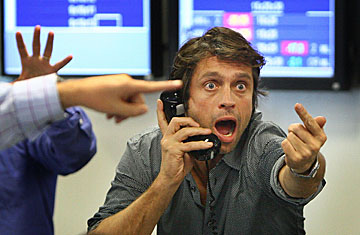
A broker on ICAP's dealing floor calls for prices on Oct. 9 in London
Call it capitulation: around the world, traders spooked by no end of bad news are dumping shares wholesale. That process continued on Friday as indexes in Asia and Europe opened trading with breathtaking falls of up to 10%. Though most markets partially rallied to limit losses to single digits, it represented only the most recent in a series of bearish days that threaten to transform a global credit crisis into a global economic crash. Does this make sense?
"The markets have gone completely crazy and are reacting in fear to a bad situation in a way guaranteed to make it far worse," says Marc Touati, deputy executive manager of the French economic- and finance-research group Global Equities. "We once had 'irrational exuberance' pushing markets ever higher; now we have irrational pessimism running them into the ground. People have to calm down, or we're in for big trouble."
Chilling out is no mean feat for traders and investors these days, though; they appear to see panic selling as the better option. On Friday, Hong Kong's Hang Seng fell 7.19%, while trading in Australia shot down 8.2%. Japan's Nikkei index dropped 9.62%, bringing its total loss for the week to 24%. Even before Asia's miserable day was over, European markets gave new force to the glumfest, opening with plunges near or in double digits. By day's end, those declines had been scaled back to 8.85% on London's FTSE 100, 7.7% on Paris' CAC 40, and 7% on Frankfurt's DAX index. Vienna's market lost 10% upon resumption of trading after temporary suspension there, while exchanges in Moscow and Jakarta were considered too volatile to even reopen.
Friday's international contagion of bearishness was inspired by Thursday's sell-off frenzy in New York City, which drove the Dow Jones index down 7% and neatly erased $872 billion of value from company and shareholder books. Fears that Wall Street would suffer another battering session Friday proved founded, as the Dow traded sharply down in the morning. Observers short on rational explanations for the nosedive could find solace only in the calendar: at least trading ceases on weekends.
"It's pure panic, and the lack of logic involved explains the inability of markets to find new, stable values for stocks," says Deutsche Bank euro-zone economist David Naudé. He concurs with Touati that while the credit crisis and its consequences are grave, the wider economic realities don't merit the dread that is driving market reaction — at least not yet.
Low oil prices and a falling euro, for instance, would have been considered generally good developments only a few months ago. Yet markets are so spooked that they're driving indexes into the ground and thereby increasing the chance of general economic contamination. "We're back to the most basic behavior of stock markets: people buy when they see everyone else buying, and they sell when everyone else is selling," says Naudé. "Confidence is gone despite the generally quick and positive intervention by governments."
Meanwhile, there's evidence that the disconnect between traders and macroeconomic realities is matched by a divide over how market movers and their publics see things. After the French government pledged to guarantee all money in private savings funds, a poll published Friday by the daily Le Figaro showed 79% of the public expressing confidence in the stability of the banks. A similar poll in Germany found 57% feeling protected by government promises to cover private savings.
That difference may be a reflection of Germany's relative tardiness in addressing the crisis and high-profile $68 billion bailout of its Hypo Real Estate mortgage group. It could also reflect the French public's belief that its national penchant for state intervention into private-sector economics will not prove lacking this time around.
The sell-off will end eventually, one way or another. Governments could follow the nerve-racked Russians and suspend trading altogether, in a bid, as Touati says, to stop "markets from sawing off the branch they're sitting on." The more likely solution, Touati predicts, will soon come as "smart and steely investors realize selling now is a sure way to lose, while buying now will determine who the big winners tomorrow will be.
"It will take courage to break from the herd," Touati continues, "but those who do it first are the masters of the market down the line."
